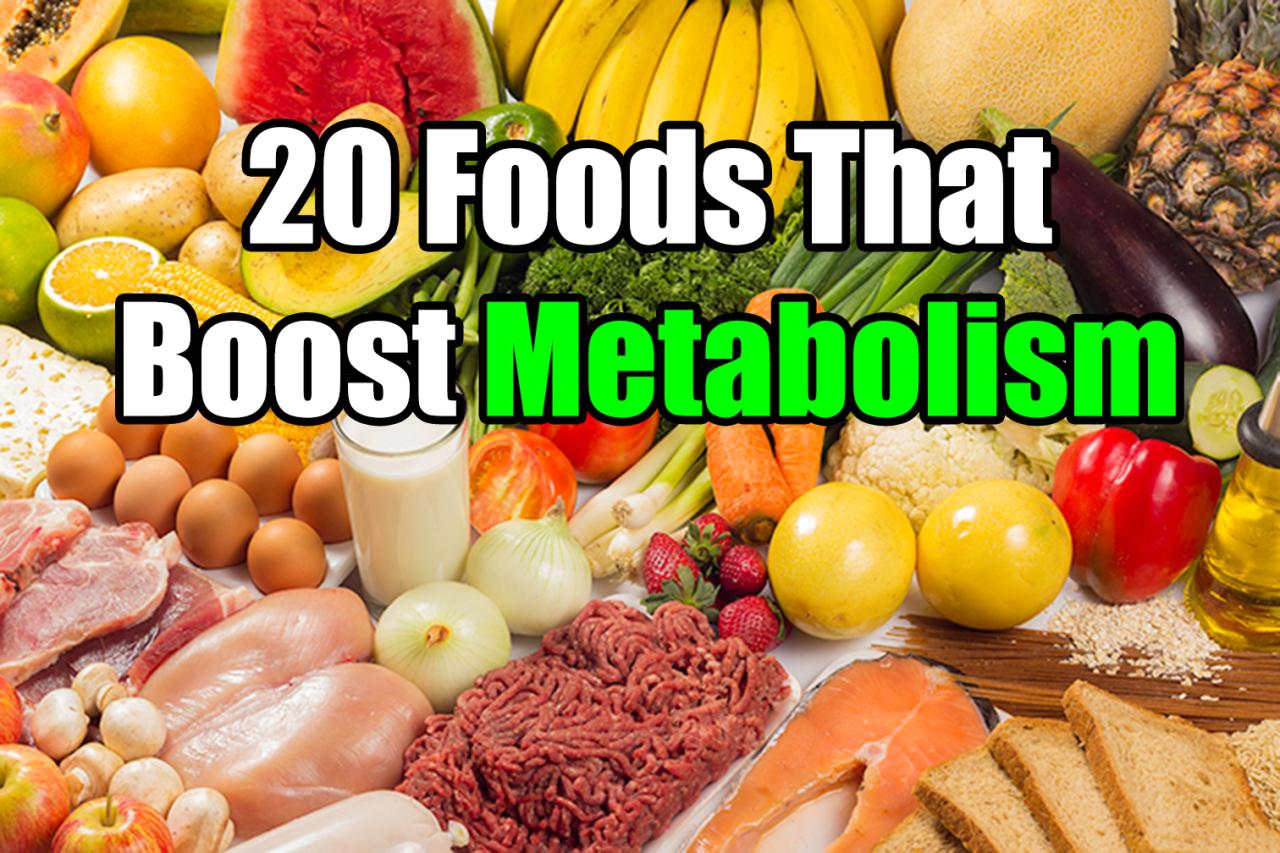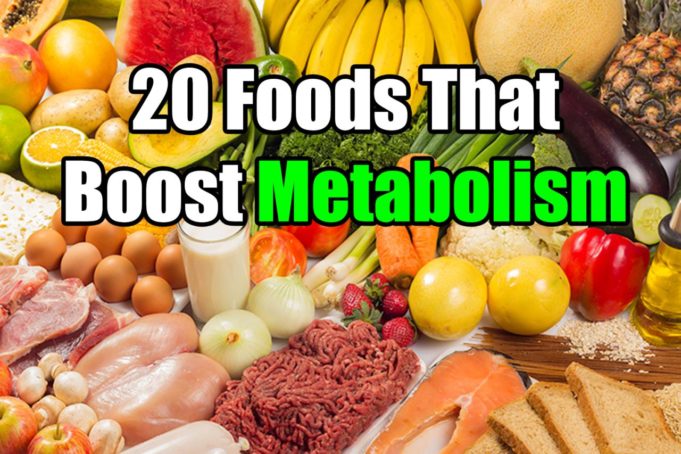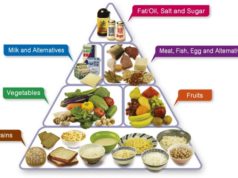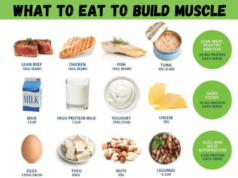How to lose weight with a slow metabolism and boost energy? It’s a question that echoes in the minds of many, a quest for vitality and a leaner physique. Imagine a world where you wake up feeling energized, not sluggish, where your body burns calories like a furnace, and where your clothes fit just a little bit better.
This isn’t a pipe dream; it’s a roadmap to unlocking your body’s potential. By understanding the intricate relationship between metabolism and energy levels, and by implementing strategic dietary, exercise, and lifestyle changes, you can transform your body from the inside out.
This guide will delve into the science behind a slow metabolism, exploring the common culprits that can slow down your body’s calorie-burning engine. We’ll dissect the power of nutrient-rich foods, unveil the secrets of effective workouts, and shed light on the often-overlooked lifestyle factors that can make or break your weight loss journey.
Get ready to unlock your inner energy and unleash the power of your metabolism!
Understanding Slow Metabolism and Energy Levels

Imagine your body as a bustling factory, constantly churning out energy to keep you going. This energy production is governed by your metabolism, the rate at which your body burns calories. A slow metabolism means this factory is operating at a lower pace, leading to decreased energy levels and potential weight gain.
The Relationship Between Metabolism and Energy Levels
Your metabolism is directly linked to your energy levels. When your metabolism is functioning efficiently, your body converts food into energy effectively, providing you with the fuel you need to power through your day. Conversely, a slow metabolism results in less energy production, leaving you feeling sluggish and fatigued.
Think of it like a car running on low fuel; it’s going to sputter and struggle to get you where you need to go.
Factors Contributing to a Slow Metabolism
Several factors can contribute to a slow metabolism, including:
- Age:As we age, our metabolic rate naturally declines. This is due to a decrease in muscle mass and an increase in body fat, both of which affect how efficiently our bodies burn calories.
- Genetics:Your genes play a significant role in determining your baseline metabolic rate. Some people are naturally predisposed to a slower metabolism than others.
- Diet:A diet low in protein and high in processed foods can slow down your metabolism. Protein is essential for building and maintaining muscle mass, which is crucial for a healthy metabolism. Processed foods, on the other hand, are often high in calories and low in nutrients, which can contribute to weight gain and a sluggish metabolism.
- Lack of Exercise:Regular exercise is essential for maintaining a healthy metabolism. When you exercise, you build muscle mass, which boosts your metabolic rate. Exercise also helps to increase your body’s sensitivity to insulin, which improves your body’s ability to use glucose for energy.
- Hormonal Imbalances:Hormonal imbalances, such as hypothyroidism, can also lead to a slow metabolism. Hypothyroidism is a condition in which the thyroid gland doesn’t produce enough thyroid hormone, which plays a crucial role in regulating metabolism.
- Sleep Deprivation:When you’re sleep-deprived, your body produces more of the stress hormone cortisol. High levels of cortisol can lead to a decrease in metabolism and an increase in appetite.
Symptoms of Low Energy Levels
Experiencing low energy levels can manifest in various ways, including:
- Constant Fatigue:Feeling exhausted even after getting enough sleep.
- Difficulty Concentrating:Struggling to focus and complete tasks.
- Increased Irritability:Feeling easily frustrated or agitated.
- Muscle Weakness:Experiencing weakness or soreness in your muscles.
- Slowed Reaction Time:Taking longer to respond to stimuli.
Dietary Strategies for Weight Loss with a Slow Metabolism: How To Lose Weight With A Slow Metabolism And Boost Energy
A slow metabolism can make losing weight feel like an uphill battle, but with the right dietary strategies, you can turn the tide and shed those extra pounds. The key lies in creating a balanced meal plan that fuels your body with the right nutrients while boosting your calorie expenditure.
Designing a Balanced Meal Plan
A balanced meal plan for individuals with slow metabolisms focuses on nutrient-dense foods that provide essential vitamins, minerals, and antioxidants without overloading the body with excess calories. Here’s a breakdown of what to prioritize:
- Lean Protein:Protein plays a crucial role in boosting metabolism. Aim for lean protein sources like chicken breast, fish, beans, lentils, and tofu. These options are packed with protein and low in saturated fat, making them ideal for weight loss.
- Complex Carbohydrates:Opt for complex carbohydrates like whole grains, brown rice, quinoa, and oats. These carbohydrates are digested slowly, providing sustained energy and preventing blood sugar spikes that can lead to fat storage.
- Healthy Fats:While limiting overall fat intake is essential, incorporating healthy fats like those found in avocados, nuts, seeds, and olive oil is crucial. These fats support hormone production and help you feel satiated, preventing overeating.
- Fruits and Vegetables:Load up on fruits and vegetables, which are packed with vitamins, minerals, fiber, and antioxidants. These nutrient-rich foods promote a healthy gut microbiome, essential for optimal metabolism.
Increasing Calorie Expenditure through Dietary Choices
While a balanced diet is crucial, you can further boost your calorie expenditure through strategic dietary choices. Here’s how:
- Spices and Herbs:Incorporate spices like ginger, cinnamon, cayenne pepper, and turmeric into your meals. These spices have thermogenic properties, meaning they can slightly increase your body’s temperature and calorie burn.
- Water Consumption:Drinking plenty of water throughout the day can boost your metabolism. Water helps flush out toxins, aids in digestion, and increases calorie expenditure.
- Intermittent Fasting:Intermittent fasting involves cycling between periods of eating and fasting. This practice can help regulate insulin levels, promote fat burning, and boost metabolism.
Role of Macronutrients in Weight Loss
Macronutrients are the building blocks of our diet, and understanding their role in weight loss is crucial.
- Protein:Protein has the highest thermic effect, meaning it requires more energy to digest and process than carbohydrates or fats. This can lead to a slight increase in calorie expenditure. Protein also helps preserve muscle mass during weight loss, which is essential for maintaining a healthy metabolism.
- Carbohydrates:While carbohydrates are essential for energy, choosing complex carbohydrates over simple sugars is crucial. Simple sugars are quickly digested, leading to blood sugar spikes and subsequent crashes, which can hinder weight loss.
- Fats:Fats provide essential nutrients and help us feel full, but they are calorie-dense. It’s crucial to choose healthy fats over saturated and trans fats, which can contribute to weight gain and cardiovascular problems.
Exercise and Activity for Boosting Energy and Metabolism
You might think that exercising when you’re already feeling sluggish is counterintuitive, but it’s actually a fantastic way to kick-start your metabolism and increase your energy levels. Think of it like this: your body is a car, and exercise is the fuel that gets it going.
The more you move, the better your engine runs.
Benefits of Combining Cardio and Strength Training, How to lose weight with a slow metabolism and boost energy
Regular exercise, especially a combination of cardio and strength training, is key to revving up your metabolism and boosting your energy levels. Cardio exercises like running, swimming, or cycling help you burn calories and improve your cardiovascular health. Strength training, on the other hand, helps build muscle mass, which increases your metabolism even when you’re at rest.
This means you burn more calories even when you’re not actively exercising.
High-Intensity Interval Training (HIIT) for Metabolism
High-intensity interval training (HIIT) is a great way to maximize your workout time and boost your metabolism. HIIT involves short bursts of intense exercise followed by brief recovery periods. This type of training can help you burn more calories in a shorter amount of time, and it also improves your cardiovascular health and endurance.
Examples of Exercises to Incorporate into Daily Routines
You don’t need to spend hours at the gym to get a good workout. Here are some examples of exercises you can easily incorporate into your daily routine:
- Take the stairs instead of the elevator.
- Walk or bike to work or the grocery store.
- Do some squats, lunges, or push-ups during commercial breaks while watching TV.
- Take a brisk walk or jog during your lunch break.
Even small changes in your daily routine can make a big difference in your overall health and energy levels.
Slow metabolism got you feeling like a sloth in a sugar coma? Don’t worry, you’re not alone! The key is to fuel your body with the right stuff to get those engines revving. And guess what? You don’t have to feel like you’re constantly battling hunger pangs to do it.
Check out How to lose weight without feeling hungry and stay motivated for some seriously delicious tips! Once you’ve got that hunger under control, you can focus on boosting your metabolism with those healthy fats and lean proteins, and watch your energy levels soar like a rocket ship!
Lifestyle Modifications for Weight Loss and Energy Enhancement
Lifestyle modifications play a crucial role in supporting weight loss and energy levels, especially when dealing with a slow metabolism. By adopting healthy habits, you can create an environment that fosters both physical and mental well-being, leading to a more balanced and energetic lifestyle.
Managing Stress and Improving Sleep Quality
Chronic stress can negatively impact your metabolism and energy levels. When you’re stressed, your body releases cortisol, a hormone that can lead to increased appetite, fat storage, and reduced energy. Prioritizing stress management is essential for weight loss and energy enhancement.
Trying to shed pounds with a metabolism slower than a sloth on a Sunday afternoon? Don’t despair! Boosting energy and losing weight isn’t about starving yourself, it’s about making smart choices. Check out Effective strategies for long-term weight loss and maintenance to learn about sustainable strategies that can help you reach your goals.
Remember, slow and steady wins the race, even if your metabolism feels like it’s running in reverse!
- Engage in relaxation techniques:Deep breathing exercises, meditation, and yoga can help calm your nervous system and reduce stress hormone levels.
- Prioritize sleep:Aim for 7-9 hours of quality sleep each night. Sleep deprivation can disrupt hormonal balance, leading to increased appetite and decreased metabolism.
- Seek professional support:If stress is overwhelming, consider seeking guidance from a therapist or counselor. They can provide tools and strategies for managing stress effectively.
Hydration and Its Impact on Metabolism
Water is essential for many bodily functions, including metabolism. Adequate hydration can help boost your metabolism, aid in calorie burning, and prevent dehydration-related fatigue.
- Drink water throughout the day:Aim for 8 glasses of water per day, or more depending on your activity level and climate.
- Avoid sugary drinks:Sugary beverages can contribute to weight gain and can dehydrate you, hindering your metabolism.
- Eat fruits and vegetables rich in water:Fruits and vegetables like watermelon, cucumbers, and spinach are naturally hydrating and can help you stay hydrated throughout the day.
Incorporating Mindfulness and Relaxation Techniques
Mindfulness and relaxation techniques can help reduce stress, improve sleep quality, and promote overall well-being. These practices can help you develop a greater awareness of your body and its signals, allowing you to make healthier choices.
- Practice mindfulness meditation:Mindfulness meditation involves focusing on the present moment without judgment. It can help reduce stress, improve focus, and promote emotional regulation.
- Engage in relaxation techniques:Techniques like deep breathing exercises, progressive muscle relaxation, and guided imagery can help calm your mind and body, reducing stress and promoting relaxation.
- Spend time in nature:Spending time in nature has been shown to reduce stress and improve mood. Take walks in the park, hike in the woods, or simply sit under a tree and enjoy the fresh air.
Addressing Underlying Health Conditions
Your metabolism and energy levels are intricately linked to your overall health. Sometimes, a sluggish metabolism or low energy isn’t just a matter of diet and exercise – it could be a sign of an underlying health condition.
The Connection Between Health Conditions and Metabolism
Certain health conditions can directly impact your metabolism and energy levels. For example, thyroid disorders like hypothyroidism can slow down your metabolism, leading to weight gain and fatigue. Similarly, conditions like diabetes, polycystic ovary syndrome (PCOS), and even sleep apnea can affect your body’s ability to regulate energy efficiently.
Consulting a Healthcare Professional for Personalized Advice
If you suspect an underlying health condition might be contributing to your weight loss struggles or low energy, it’s crucial to consult a healthcare professional. They can conduct a thorough evaluation, including medical history, physical examination, and potentially blood tests, to identify any underlying issues.
Medical Interventions for Underlying Conditions
Depending on the diagnosed condition, your doctor may recommend various medical interventions to manage your metabolism and energy levels. For instance, hypothyroidism is often treated with hormone replacement therapy, while diabetes might require medication, lifestyle modifications, or insulin therapy.
Remember, addressing any underlying health conditions is a critical step in achieving sustainable weight loss and boosting your energy levels.
Long-Term Sustainability and Motivation
Losing weight and maintaining a healthy lifestyle is a marathon, not a sprint. It requires dedication, consistency, and a plan for long-term success. While the initial focus might be on shedding pounds, the true victory lies in sustaining those changes and building a healthier you for the long haul.
Setting Realistic Goals and Tracking Progress
Setting realistic goals is crucial for staying motivated and preventing discouragement. Instead of aiming for drastic weight loss in a short time, focus on gradual and sustainable changes. Aim for a healthy weight loss of 1-2 pounds per week. This approach is more likely to result in long-term success.
- Break Down Goals:Instead of focusing on the overall weight loss goal, break it down into smaller, more achievable milestones. For example, instead of aiming to lose 20 pounds, focus on losing 5 pounds first.
- Track Progress:Tracking your progress is essential for staying motivated and seeing how far you’ve come. Keep a food diary, log your exercise sessions, and measure your weight and body measurements regularly. This will help you identify patterns and adjust your plan as needed.
Losing weight with a slow metabolism can feel like trying to outrun a sloth in a marathon – slow and painful. But fear not, fellow sluggish souls! Boosting your energy and shedding those extra pounds can be done, even with a busy schedule.
Check out this best diet plan for busy professionals with limited time for some time-saving tips and tricks. Remember, even a snail can make it to the finish line with the right strategy, and you’re way faster than a snail!
- Celebrate Successes:Don’t forget to celebrate your achievements along the way! Reward yourself for reaching your milestones, whether it’s a new workout outfit, a healthy meal out, or simply a night off from cooking.
Strategies for Staying Motivated and Overcoming Challenges
Maintaining motivation is an ongoing journey. There will be times when you feel tempted to give up or slip back into old habits. It’s important to have a plan in place to deal with these challenges.
- Find Your Why:Identify your personal reasons for wanting to lose weight and improve your health. This will be your driving force when motivation wanes.
- Build a Support System:Surround yourself with people who support your goals. Talk to friends, family, or a health professional about your journey. Joining a support group or finding an online community can also provide encouragement and accountability.
- Focus on Non-Scale Victories:Don’t solely rely on the scale to measure your progress. Celebrate non-scale victories like increased energy levels, better sleep, improved mood, and fitting into smaller clothes.
- Be Kind to Yourself:It’s okay to have setbacks. Don’t beat yourself up if you slip up. Learn from your mistakes and get back on track.
- Reward Yourself:When you reach a milestone, reward yourself with something you enjoy. This could be a new workout outfit, a healthy meal out, or a relaxing spa day.
Conclusion
Remember, achieving a healthy weight and boosting your energy levels is a marathon, not a sprint. It’s about making sustainable changes that fit into your life, not about quick fixes or fad diets. Embrace the journey, celebrate your successes, and don’t be afraid to seek guidance from healthcare professionals along the way.
By taking charge of your health, you’re not just losing weight; you’re gaining a life full of vitality, energy, and confidence. So, are you ready to take the first step? Let’s get started!
Essential FAQs
Can I boost my metabolism without exercise?
While exercise is a fantastic way to rev up your metabolism, you can also boost it through diet. Eating nutrient-rich foods, especially those high in protein, can help increase your metabolic rate.
How do I know if I have a slow metabolism?
Signs of a slow metabolism can include feeling tired easily, having difficulty losing weight, and experiencing constant cravings. If you suspect a slow metabolism, it’s best to consult with a healthcare professional.
What are some good snacks for boosting metabolism?
Opt for snacks rich in protein and healthy fats, such as nuts, seeds, Greek yogurt, or hard-boiled eggs. These snacks keep you feeling full and provide sustained energy.
Is it possible to lose weight with a slow metabolism?
Absolutely! It may take a little more effort, but with the right approach, you can lose weight even if you have a slow metabolism. Focus on a balanced diet, regular exercise, and lifestyle modifications.
























